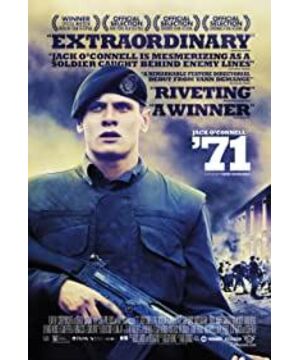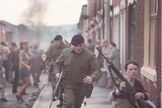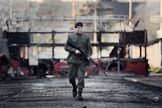Just as the North-South separation of North Korea is an enduring theme in Korean films, the Irish War of Independence and the resulting Civil War in Northern Ireland have always been favored by the British film industry, and many excellent movies have been born. For example, "Michael Collins" in 1996, "Bloody Sunday" in 2002, "Wind Blowing Wheat Wave" in 2006, "Hunger" in 2008 and so on. In 2014, French director Jan De Mangé directed "Lost 1971". He received multiple nominations at the British Independent Film Awards that year and won the Best Director Award, adding a touch of color to this theme.
Regarding the background of the Civil War in Northern Ireland, here is a brief stroke. In the 1920s, after the bloody struggle of the Irish people, Ireland finally separated from Britain as the "Irish Free State" after the War of Independence. However, Northern Ireland, which is composed of six counties dominated by Protestants, has chosen to withdraw from the Irish Free State and stay in the British Kingdom because it is worried about becoming a minority in the Catholic-dominant Ireland. This is called "Northern Ireland." The origin of the region. But the problem came again. Even in Northern Ireland, there were two factions that believed in Catholicism and Protestantism, so a protracted civil war began. At the same time, Britain and Ireland, which were inextricably linked, were also brought in, forming a Quartet. Staggered complex situation.
Unlike most films of this type with Irish (Northern Ireland) as the protagonist, the director focused his perspective on a British recruit. In fact, the protagonists of many anti-war movies are recruits, the most famous being Stanley Kubrick's "Full Metal Shell" and Michael Cimino's "Deer Hunter". Often recruits can best reflect the cruelty of war, as well as the destruction of spirit and body, human nature and life. At this level, "Lost 1971" is no different. As a recruit who just came out of the military academy, Gary soon experienced the treacherous and merciless situation in Belfast.
On the other hand, as a British soldier, he is not one of the main contradictions of this war (the nationalist community representing Catholics and the Unionist community representing Protestants), but he is representing the British government to maintain order. Neutrals. It is with such an identity that the film can stand in a more neutral and objective perspective to show the open and secret struggles of various levels and forces in the Northern Ireland Civil War.
Reflected in the plot, we can see that the director successfully created a series of group portraits. In addition to Gary this recruit, there are also local people, extremists, military personnel, and so on. Among these people, there are civilians who have been deceived by the war, such as precocious children and brutal teenagers; there are righteous people who are still sober, such as a middle-aged man and his daughter who came from a medical soldier; and speculation with ghosts in mind. Soldiers, such as Gary's boss and members of local organizations. It can be said that for a newcomer, Belfast is like a turbulent, bottomless vortex.
Therefore, in this war-themed work, several small-scale conflicts have been eliminated, but the elements of horror and suspense dominate the majority. In the process of maintaining order, Gary, who was alone, saw his comrade-in-arms get a headshot. He had no weapons and lost his way with the large forces. He had to start the desperate mode of "Gary Run" in the Catholic neighborhood. Beware of extremists on the dangerous streets, and at the same time keep your eyes open among the people of all colors who are difficult to distinguish between ourselves and the enemy.
Hemingway said in "Farewell, Weapon": "I have been observing for a long time in the war, and I have not seen the so-called sacred and glorious things. The so-called sacrifice is like the slaughterhouse in Chicago. It is just the meat that is slaughtered here. Not in cans, but buried on the spot.” Gary is unfortunate. It didn’t take long to be a soldier to experience the fear and absurdity of the "slaughterhouse". After walking around the edge of life and death, he never wanted to touch this bitch again. The war of raising. But Gary was lucky. The first thing that was strangled in the war was the truth, and the second thing was probably humanity. Before he lost his humanity, Gary returned to England to reunite with his younger brother. What could be more fortunate than this. Something?
♑
View more about '71 reviews











